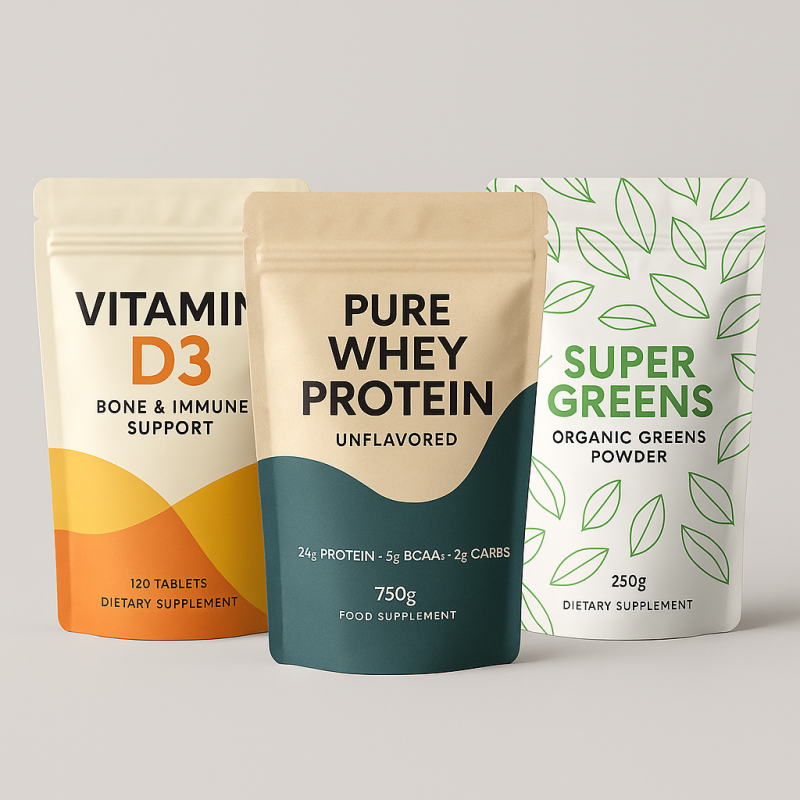Dreaming of launching your own supplement brand? You’re in the right place. The health and wellness industry is booming, and more consumers are actively seeking products to support their lifestyles. But turning that dream into a reality can feel overwhelming. Where do you even begin?

This is not just another article. This is your comprehensive, step-by-step roadmap. We’ll guide you through every stage, from finding your unique idea to launching and scaling your business. Forget the confusion; it’s time for clarity and action.
Step 1: Find Your Niche (Don’t Sell to Everyone)
The biggest mistake new entrepreneurs make is trying to appeal to everyone. The supplement market is crowded. Your key to success isn’t a massive budget; it’s a sharp focus. A niche is a specialized segment of the market for a particular kind of product or service.
Why a Niche is Your Greatest Asset
A well-defined niche allows you to:
- Reduce Competition: Instead of competing with giants like Optimum Nutrition, you become a big fish in a small pond.
- Lower Marketing Costs: You know exactly who your customer is, where to find them, and what message resonates with them.
- Build a Loyal Community: People are drawn to brands that “get” them. A niche brand fosters a stronger sense of identity and loyalty.
How to Identify a Profitable Niche
Start by brainstorming at the intersection of your passion and market demand. Think about specific communities and their unique needs.
- By Demographic: Supplements for women over 40, college students, or busy professionals.
- By Lifestyle: Products for vegans, keto dieters, CrossFit athletes, or gamers (e.g., focus and energy formulas).
- By Goal: Supplements for weight management, better sleep, joint support, or cognitive enhancement.
Validate Your Idea: Is There a Hungry Market?
Once you have an idea, validate it. Use tools like Google Trends to check interest over time. Search for your niche keywords on social media platforms like Instagram and Reddit. Are people actively discussing problems your product could solve? If you find vibrant communities and active discussions, you’re on the right track.
Step 2: Develop a Winning Product Formula
With a niche in mind, it’s time to think about your actual product. You have two primary paths.
Option 1: Private Label (The Fast-Track)
Private labeling is when you choose a pre-existing, market-tested formula from a manufacturer and sell it under your own brand name.
- Pros: Faster to market, lower startup costs, proven formulas.
- Cons: Less unique, you’re selling a similar product to other brands.
This is the best option for most beginners as it minimizes risk and allows you to focus on branding and marketing.
Option 2: Custom Formulation (The Unique Path)
If you have a truly unique product idea and the capital to back it up, you can work with a manufacturer to create a custom formula from scratch.
- Pros: 100% unique product, full control over ingredients, strong competitive advantage.
- Cons: Much higher cost, longer development time, requires more expertise.
Sourcing High-Quality, Safe Ingredients
Whether private label or custom, ingredient quality is non-negotiable. Your reputation depends on it. Ensure your manufacturer sources from reputable suppliers and can provide a Certificate of Analysis (CoA) for each ingredient, verifying its purity and potency.
Step 3: Navigate the Legal Maze: Business & FDA Compliance
This is the step that intimidates most people, but it’s straightforward if you take it one piece at a time.
Setting Up Your Business
While you could start as a sole proprietorship, it’s highly recommended to form a Limited Liability Company (LLC). An LLC separates your personal assets from your business assets, providing crucial liability protection. You can file for an LLC through online legal services or with the help of a local attorney.

Understanding FDA Regulations
In the United States, the Food and Drug Administration (FDA) regulates dietary supplements under the Dietary Supplement Health and Education Act of 1994 (DSHEA). Here’s what you need to know:
- You cannot make disease claims. You can’t say your product “cures” or “treats” any disease. You can make “structure/function” claims, like “supports a healthy immune system,” but you must have scientific evidence to back them up.
- Your manufacturer must be cGMP compliant. cGMP stands for Current Good Manufacturing Practices. This is a set of FDA regulations that ensures the identity, purity, quality, strength, and composition of dietary supplements. Your #1 job is to ensure your chosen manufacturer is cGMP certified.
Do You Need a License to Sell Supplements?
Generally, there is no single federal “license” required to sell dietary supplements. However, you will need standard business licenses and permits required by your state and local government.
Getting Business Insurance
Product liability insurance is essential. It protects your business in the event a customer has an adverse reaction to your product. Do not launch without it.
Step 4: Calculate Your Startup Costs (A Realistic Budget)
The question everyone asks: “How much does it cost to start a supplement brand?” The answer varies wildly, but here is a realistic breakdown for a small, private-label launch.
| Expense Category | Estimated Cost Range | Notes |
|---|---|---|
| Business Formation (LLC) | $100 – $800 | Varies by state. |
| Initial Inventory (MOQ) | $2,500 – $7,000 | MOQ = Minimum Order Quantity. Your biggest upfront cost. |
| Branding & Label Design | $500 – $2,500 | Can be lower if you have design skills. |
| Website (Shopify) | $300 – $1,000 | Includes theme, apps, and initial subscription fees. |
| Insurance (Annual) | $500 – $2,000 | Depends on your product and coverage. |
| Marketing (Initial Launch) | $500 – $3,000+ | For ads, influencers, and content. |
| Total Estimated Range | $4,400 – $16,300+ |
You can start on the lower end by choosing a manufacturer with a low MOQ and handling more of the branding and marketing yourself.
Step 5: Build a Brand That Connects, Not Just Sells
Your product is what you sell, but your brand is why people choose you.
Crafting Your Brand Name and Story
Why did you start this brand? What is your mission? Your story is your most powerful marketing tool. A good name is memorable, easy to spell, and reflects your brand’s ethos. Check if the domain name and social media handles are available before you commit.
Designing a Professional Logo and Label
Your label is your most important piece of real estate. It must be:
- Compliant: The FDA has strict rules for what must be on a supplement label (e.g., supplement facts panel, net quantity, ingredient list). Your manufacturer can help guide you here.
- Attractive: It must stand out on a digital shelf and look professional.
- Informative: Clearly communicate what the product is and its key benefits.
Defining Your Unique Selling Proposition (USP)
What makes you different? Is it your unique ingredient blend? Your commitment to sustainability? Your target audience? Your USP should be a single, clear sentence. Example: “The only plant-based protein powder specifically formulated to support gut health for vegan athletes.”
Step 6: Find a Reputable Manufacturer (Your Most Important Partner)
Choosing your manufacturer is the most critical decision you will make. This partner holds the quality of your product and the reputation of your brand in their hands.
Key Criteria for Vetting a Manufacturer
- cGMP Certified: This is non-negotiable. Ask for proof of their certification.
- Third-Party Testing: Do they use independent labs to test their raw materials and finished products? This ensures an unbiased assessment of quality.
- Reasonable MOQs: Find a manufacturer whose Minimum Order Quantities align with your budget.
- Excellent Communication: Are they responsive, helpful, and transparent?
Where to Find Potential Manufacturing Partners
A simple Google search for “private label supplement manufacturers USA” or “custom supplement formulation” is a good starting point. Trade shows like CHTNature are also excellent for meeting partners in person.

Step 7: Create Your Online Storefront
Your website is your 24/7 salesperson. It needs to be professional, trustworthy, and easy to use.
Why Shopify is the Top Choice for Supplement Brands
Shopify is the leading e-commerce platform for a reason. It’s user-friendly, scalable, and has a vast ecosystem of apps. Crucially, it works with payment processors that are friendly to supplement businesses, which can be a major hurdle on other platforms.
Essential Pages for Your Website
- Homepage: Your virtual front door.
- Product Pages: High-quality images, compelling descriptions, clear benefits, and customer reviews.
- About Us Page: Tell your brand story.
- Contact Page & FAQ: Make it easy for customers to get help.
Step 8: Craft Your Go-to-Market Strategy
You’ve built the brand; now it’s time to find your customers.
Pre-Launch: Building Hype
Don’t wait until your product is in stock to start marketing. Create a “coming soon” landing page to collect emails. Post behind-the-scenes content on social media. Build anticipation.
Launch Day: Driving Your First Sales
Reach out to the email list you built. Consider a special launch-day discount. Collaborate with a few small influencers in your niche to post about your product on launch day.
Content Marketing & SEO: The Long-Term Game
Consistently creating valuable content (blog posts, videos) related to your niche is the best way to build trust and attract customers through Google search over the long term.
Step 9: Plan for Shipping and Fulfillment
A great product can be ruined by a poor shipping experience.
In-House vs. Third-Party Logistics (3PL)
Initially, you’ll likely ship orders yourself (in-house). As you grow, consider partnering with a 3PL company. They store your inventory and handle all the picking, packing, and shipping for you, freeing you up to focus on growing the business.
Step 10: Scale and Grow Your Empire
Launching is just the beginning.
- Gather Customer Feedback: Use reviews and surveys to improve your products and customer experience.
- Expand Your Product Line: Once you have a successful hero product, ask your community what they want next.
- Optimize for Lifetime Value (LTV): Use email marketing, subscriptions, and loyalty programs to encourage repeat purchases.
Frequently Asked Questions (FAQ)
Q: How much does it cost to start a supplement line? A: A small, private-label launch can range from $4,000 to $16,000+, with the largest cost being your initial inventory.
Q: Is starting a supplement business profitable? A: It can be very profitable due to high-profit margins and repeat purchases. However, success depends on strong branding, effective marketing, and a high-quality product.
Q: Do you need a license to sell supplements? A: There is no specific federal “supplement license,” but you need to register your business (e.g., as an LLC) and obtain any standard business licenses required by your city and state. Your manufacturer must be cGMP compliant.
Q: How do I create my own supplement formula? A: You can work with a “custom formulation” manufacturer. You will collaborate with their chemists and food scientists to develop a unique product, but this is a costly and time-consuming process recommended for experienced brands.
Conclusion: Your Journey Starts Now
Starting a supplement brand is a marathon, not a sprint. It requires dedication, a passion for helping people, and a commitment to quality. You now have the complete roadmap. The only thing left to do is take the first step.



